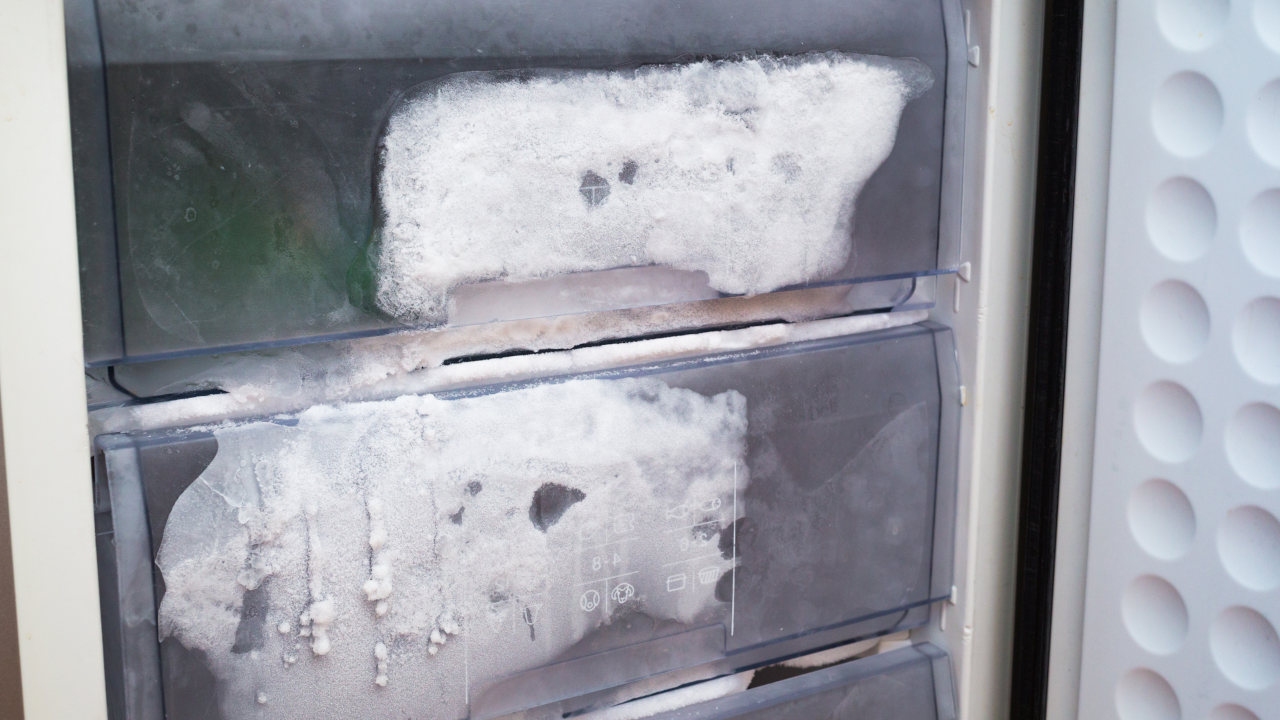How to defrost a freezer
To maintain the efficiency of your integrated or freestanding freezer, it is a good idea to defrost your appliance regularly. Depending on the model you own, your appliance may do this automatically. However, you may need to defrost your freezer manually. We’ve put together this handy guide to help you defrost a freezer or fridge freezer.
To defrost your freezer follow these simple steps
- Firstly, turn off and unplug your freezer at the wall.
- Remove all frozen food from your freezer. To prevent food from thawing, place them in an insulated cooler bag or in another freezer.
- Remove all drawers and shelves. Do not force any drawers/shelves out of the freezer as this can cause damage to the appliance.
- Place hot water (in bowls or glasses) inside your freezer, making sure you have plenty of towels and a suitable container for the water that will be created from thawing ice.
- Wait for the freezer to defrost. This can take a number of hours. Do not try and speed up the process, it is important to leave the appliance to defrost on its own. Using sharp objects to remove ice can damage the appliance.
- Whilst the freezer is defrosting, quickly clean the appliance’s interior using a damp cloth.
- Before turning your freezer back on, make sure to dry the interior. This will prevent ice-build up when the appliance is turned back on.
- Switch your appliance on and wait for the temperature to return. Once again, this may take a number of hours.
- Replace any frozen food, making sure to use/discard any defrosted food.
Before defrosting your freezer, it is important to refer to your appliances manual for guidance. If you have misplaced your manual, don't worry you can download your appliance manual here.
How to defrost a fridge freezer: To defrost your fridge freezer, simply follow the above steps. Please note that it is always best to refer to your manual for guidance of how often this should be carried out, as each model may differ.
Why should I defrost my freezer?

The importance of keeping your freezer clean and ice-free cannot be overstated. By defrosting your freezer you can free up more space for your groceries, whilst also ensuring that your freezer is running at maximum efficiency. Excessive ice acts as an insulator in a freezer, meaning your appliance needs to work harder to keep your food cold. As a result, the lifespan of your appliance may be reduced and your energy bills will increase.
How often should I defrost my freezer?
We recommend defrosting your appliance twice a year or when a frost layer of around 7mm (1/4”) has formed. This will allow the appliance to function correctly and free up any space that the ice may be taking up.
Alternatively, some Beko freezers feature our Frost Free technology. Defrosting the ice build-up in your freezer is a time-consuming and frustrating job. Thanks to our Frost-Free technology you won’t have to worry about manually defrosting your appliance. To discover more, explore our range of Frost-Free freezers.
How to defrost a freezer quickly?
Defrosting your freezer is a time-consuming and frustrating job. However, there are a few simple tricks you can follow to accelerate the defrosting process.
Firstly, when your freezer is unplugged and emptied, open the door, remove the drawers, and place a fan nearby, allowing the air to circulate inside the appliance. The air circulated will be of a higher temperature than the freezer, meaning it will encourage the ice to melt slightly faster. Please note, it is important to position your fan at a safe distance away from the freezer, making sure the melting ice does not touch the fan.
You can also speed up the melting process by increasing the temperature inside your freezer. To do this, place hot water in bowls or glasses inside your freezer, making sure you have plenty of towels and a suitable container for the water that will be created from thawing ice.
Although you may wish to speed up the process of defrosting your freezer, it is important to allow the appliance to defrost on its own. Whilst this may take several hours, this is the best way to ensure your freezer is properly defrosted without damage. Do not use sharp objects to remove ice as this can damage the appliance.
How to defrost a fridge freezer?
The process of defrosting a fridge freezer is very similar to the process followed to defrost a standard freezer. The only difference is that you will need to remove all items in the fridge and store in a cold box until the process is complete. To defrost your fridge freezer, follow the below steps:
Before defrosting your freezer, it is important to refer to your appliance’s manual for guidance. If you have misplaced your manual, don't worry you can download your appliance manual here.
- Firstly, turn off and unplug your fridge freezer at the wall.
- Remove all items in the fridge section of your appliance and store in a cold bag or in another fridge.
- Remove all frozen food from your freezer and place them in an insulated cooler bag or in another freezer.
- Remove all drawers and shelves. To avoid damage, please do not to force any drawers/shelves out of the freezer section of your appliance.
- Place hot water (in bowls or glasses) inside your freezer section of your appliance, making sure you have plenty of towels and a suitable container for the water that will be created from thawing ice.
- Wait for the freezer to defrost. This can take several hours. Do not try and speed up the process and do not use sharp objects to remove ice.
- Whilst the freezer is defrosting, quickly clean the appliance’s interior using a damp cloth.
- Before turning your fridge freezer back on, make sure to dry the interior. This will prevent ice-build up when the appliance is turned back on.
- Switch your appliance on and wait for the temperature to return. Once again, this may take several hours.
Replace any frozen food, making sure to use/discard any defrosted food. You can also replace any items removed from the fridge compartment.
How to defrost a fridge freezer without turning it off?
For safety reasons we recommend turning your fridge freezer off whilst it is defrosting. The only alternative to this is to invest in a freezer or fridge freezer that features Frost Free technology. Using an automatic fan, our Frost-Free technology removes warm air from your freezer when it enters, preventing ice build-up and ensuring that there’s no need to manually defrost or turn off your appliance. To discover more, explore our range of Frost-Free freezers.
Did you find this How-To guide useful?
Thank you for your feedback and we are sorry this How-To Guide wasn’t useful to you. If you would like further assistance, please head over to our Contact Us page.
Need Product Support?
If you have any questions about your Beko appliance, we are here to help. Finding answers and information is easy with Beko’s helpful online resources, simply browse our product support topics below and select the one that is relevant to you.
Manuals
Beko manuals contain helpful information and advice about your appliance.
View ManualsParts & Accessories
We stock genuine Beko spare parts and accessories for all of our models.
View Range NowFAQs
Browse the most asked questions about our product range.
Search FAQsRepairs
Information on our professional repair services.
View Repairs




